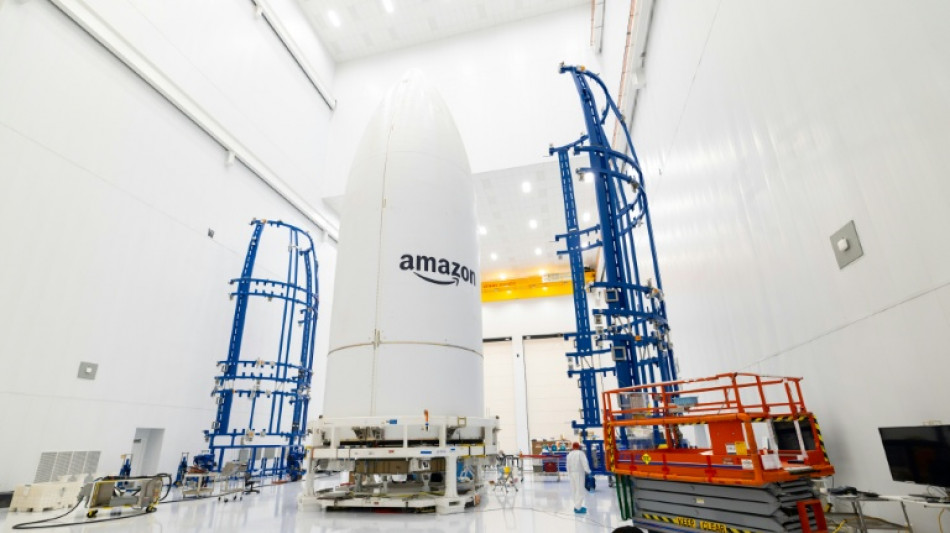
-
 Nate Bargatze to host Emmys: organizers
Nate Bargatze to host Emmys: organizers
-
US Fed Chair warns of 'tension' between employment, inflation goals

-
 Trump touts trade talks, China calls out tariff 'blackmail'
Trump touts trade talks, China calls out tariff 'blackmail'
-
US judge says 'probable cause' to hold govt in contempt over deportations

-
 US eliminates unit countering foreign disinformation
US eliminates unit countering foreign disinformation
-
Germany sees 'worrying' record dry spell in early 2025

-
 Israel says 30 percent of Gaza turned into buffer zone
Israel says 30 percent of Gaza turned into buffer zone
-
TikTok tests letting users add informative 'Footnotes'

-
 Global uncertainty will 'certainly' hit growth: World Bank president
Global uncertainty will 'certainly' hit growth: World Bank president
-
EU lists seven 'safe' countries of origin, tightening asylum rules

-
 Chelsea fans must 'trust' the process despite blip, says Maresca
Chelsea fans must 'trust' the process despite blip, says Maresca
-
Rebel rival government in Sudan 'not the answer': UK

-
 Prague zoo breeds near-extinct Brazilian mergansers
Prague zoo breeds near-extinct Brazilian mergansers
-
Macron to meet Rubio, Witkoff amid transatlantic tensions

-
 WTO chief says 'very concerned' as tariffs cut into global trade
WTO chief says 'very concerned' as tariffs cut into global trade
-
Sports bodies have 'no excuses' on trans rules after court ruling: campaigners

-
 Zverev joins Shelton in Munich ATP quarters
Zverev joins Shelton in Munich ATP quarters
-
The Trump adviser who wants to rewrite the global financial system

-
 US senator travels to El Salvador over wrongly deported migrant
US senator travels to El Salvador over wrongly deported migrant
-
UN watchdog chief says Iran 'not far' from nuclear bomb

-
 Trump says 'joke' Harvard should be stripped of funds
Trump says 'joke' Harvard should be stripped of funds
-
Macron vows punishment for French prison attackers

-
 Canada central bank holds interest rate steady amid tariffs chaos
Canada central bank holds interest rate steady amid tariffs chaos
-
Rubio headed to Paris for Ukraine war talks
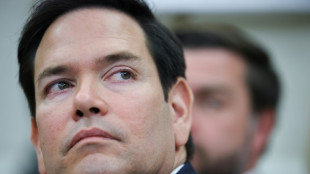
-
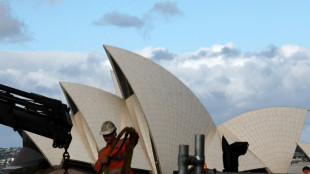 Australian PM vows not to bow to Trump on national interest
Australian PM vows not to bow to Trump on national interest
-
New attacks target France prison guard cars, home

-
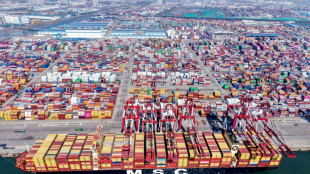 Global trade uncertainty could have 'severe negative consequences': WTO chief
Global trade uncertainty could have 'severe negative consequences': WTO chief
-
Google facing £5 bn UK lawsuit over ad searches: firms

-
 Onana to return in goal for Man Utd against Lyon: Amorim
Onana to return in goal for Man Utd against Lyon: Amorim
-
Tiktok bans user behind Gisele Pelicot 'starter kit' meme

-
 'Put it on': Dutch drive for bike helmets
'Put it on': Dutch drive for bike helmets
-
China's Xi meets Malaysian leaders, vows to 'safeguard' Asia allies
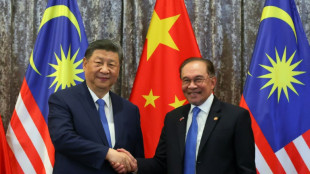
-
 France urges release of jailed Russian journalists who covered Navalny
France urges release of jailed Russian journalists who covered Navalny
-
Gabon striker Boupendza dies after 11th floor fall

-
 UK top court rules definition of 'woman' based on sex at birth
UK top court rules definition of 'woman' based on sex at birth
-
PSG keep Champions League bid alive, despite old ghosts reappearing

-
 Stocks retreat as US hits Nvidia chip export to China
Stocks retreat as US hits Nvidia chip export to China
-
China's Xi meets Malaysian leaders in diplomatic charm offensive
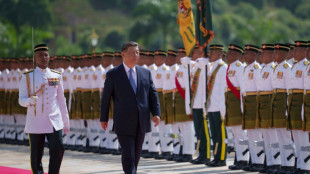
-
 Israel says no humanitarian aid will enter Gaza
Israel says no humanitarian aid will enter Gaza
-
Anxiety clouds Easter for West Bank Christians

-
 Pocket watch found on Titanic victim to go on sale in UK
Pocket watch found on Titanic victim to go on sale in UK
-
UK top court rules definition of 'a woman' based on sex at birth
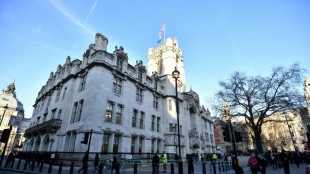
-
 All Black Ioane to join Leinster on six-month 'sabbatical'
All Black Ioane to join Leinster on six-month 'sabbatical'
-
Barca suffer morale blow in Dortmund amid quadruple hunt

-
 China tells Trump to 'stop threatening and blackmailing'
China tells Trump to 'stop threatening and blackmailing'
-
Iran FM says uranium enrichment 'non-negotiable' after Trump envoy urged halt

-
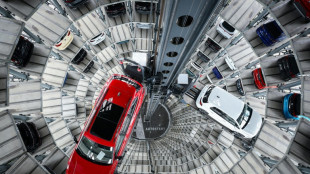 Automakers hold their breath on Trump's erratic US tariffs
Automakers hold their breath on Trump's erratic US tariffs
-
Cycling fan admits throwing bottle at Van der Poel was 'stupid'

-
 Troubled Red Bull search for path back to fast lane
Troubled Red Bull search for path back to fast lane
-
China's forecast-beating growth belies storm clouds ahead: analysts


Amazon satellite launch scrubbed due to weather
Weather prevented a rocket carrying the first batch of Amazon satellites designed to compete with Elon Musk's Starlink from lifting off Wednesday, in a setback for the planned Project Kuiper network.
"Stubborn cumulus clouds and persistent winds make liftoff not possible within the available window," read a liveblog update from operator United Launch Alliance (ULA), a joint venture between Boeing and Lockheed Martin.
Cumulus clouds are a particular danger for rockets as a nearby launch can trigger lightning strikes, ULA added.
Livestream footage showed steam venting from the white Atlas V rocket laden with 27 Project Kuiper satellites as it stood on the launchpad through successive delays.
Liftoff from Cape Canaveral in the US state of Florida had originally been slated for 7:00 pm (2300 GMT).
Like Starlink, the Kuiper service is designed to provide internet access to even the most remote and underserved areas around the world, including war zones or disaster-struck areas.
Once in orbit, the satellites will be positioned hundreds of miles above the Earth, where they will form the foundations of Project Kuiper -- a constellation that Amazon says will include more than 3,200 satellites.
Amazon, owned by billionaire Jeff Bezos, has said the internet service will go live this year.
The project's pricing has not yet been revealed, but Amazon has promised it will be in line with its existing reputation as a low-cost retailer.
Its first launch will put Amazon into direct competition with SpaceX's Starlink and other satellite internet providers.
The Musk-owned SpaceX launched the first batch of its more than 6,750 operational Starlink satellites in 2019 and is by far the sector's biggest player, boasting over five million customers worldwide.
Starlink has provided internet access to several disaster and war zones, including Morocco after a devastating 2023 earthquake there, as well as on the frontlines in Ukraine in its war with Russia.
- High competition -
Unlike traditional internet services that rely on fewer satellites that are situated more than 35,000 kilometers (22,000 miles) from Earth, those offered by Musk and soon Bezos use a low Earth orbit of between 550 and 1,300 kilometers (350-810 miles).
This allows them to relay data more rapidly to Earth, enabling internet access in areas without landline connections by copper or fiber optic cable.
"Cost, complexity, and geography can make it difficult to install traditional, ground-based fiber and wireless connectivity solutions in these areas," Amazon says.
A lower orbit, however, means so-called LEO satellites are only reachable from a smaller area, meaning more are needed for full global coverage and launches are more regular.
Still, it provides a large potential market for Amazon -- one in which it is hoping to become a key player by catching up with its main competitor.
Amazon is planning to boost satellite launches in the coming months and years, with more than 80 flights ordered by firms including ULA, Bezos's space company Blue Origin and even Musk's SpaceX.
These satellites will be gradually dispatched to the low Earth orbit, which is increasingly populated by Starlink as well as other emerging actors including Europe's OneWeb and China's Guowang.
Some have voiced fears the growing number of satellites could lead to congestion and possible collisions, as well as disturbances for astronomical observations.
The role of private hands in space has also raised political questions, particularly given the role of Musk as a key advisor to US President Donald Trump.
Musk has cast doubt on the future of Starlink in Ukraine, where it is essential for military operations in Kyiv's war with Russia that Trump wants to see ended.
He said in March, however, that "no matter how much I disagree with the Ukraine policy, Starlink will never turn off its terminals."
G.Stevens--AMWN


